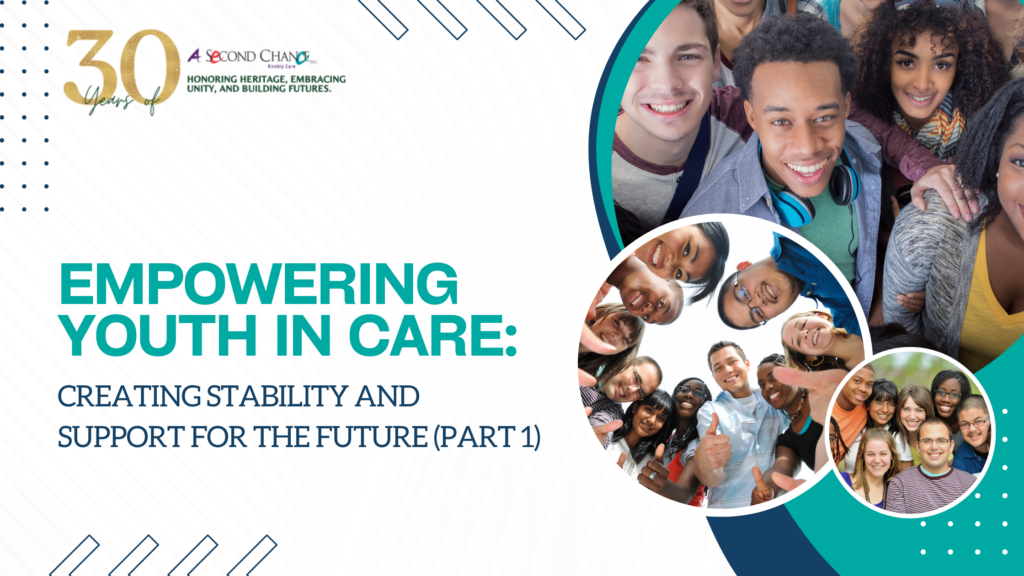Blog
Empowering Youth in Care: Creating Stability and Support for the Future (Part 1)
The journey from care to adulthood is a critical transition for many youth, one that comes with both challenges and opportunities. In this two-part series, A Second Chance, Inc. (ASCI) highlights the importance of supporting youth as they transition out of the child welfare system and into adulthood.
Tiffany Byrd, Executive Vice President of ASCI’s Philadelphia Regional Office, and Dr. Christine White-Taylor, Education Liaison II, discuss the challenges faced by youth aging out of care, and the vital programs designed to provide permanency, mentorship, and holistic support. Through their insights, we gain a deeper understanding of how young adults can navigate the complexities of life after care and empower them to build brighter futures.

At A Second Chance, Inc., one of Tiffany’s central focuses is achieving permanency for youth, ensuring long-term, stable family connections – whether through reunification, adoption, or permanent legal custody (PLC). “Permanency is crucial for emotional well-being, identity formation, and ultimately, the ability of these youth to thrive,” she explains. For Tiffany, permanency is not simply about finding a place for young people to live but about ensuring that they have the emotional and social support needed to build a strong foundation for the rest of their lives. “It’s about creating a stable, secure environment where youth can grow to their full potential, knowing they have a support system they can rely on,” she adds.
However, achieving permanency, especially for older youth, remains a significant challenge. As Tiffany notes, “Youth who transition out of care at 18 or 21 often face immense challenges, including financial instability, lack of education, and limited access to housing and resources. Without the safety net that permanency provides, many of these young adults face the risk of homelessness or long-term instability.” While permanency provides youth with a sense of security, the challenges of transitioning out of the system without such support systems in place can lead to uncertain futures.

Tiffany is acutely aware of the importance of preparing youth for this transition well before they exit the system. She emphasizes that the preparation process needs to start early, ideally around the age of 16 or 17. This preparation is about equipping young people with the skills and emotional support they need to thrive once they leave care. “Youth in care need to be prepared for adulthood well in advance. It’s not enough to start the process at 18. We need to give them the tools, knowledge, and confidence they need to succeed long before they turn 18,” she says. This proactive approach, she believes, can significantly improve the outcomes for young people once they leave the system.
Youth in care need to be prepared for adulthood well in advance. It’s not enough to start the process at 18. We need to give them the tools, knowledge, and confidence they need to succeed long before they turn 18.
Tiffany Byrd
Dr. Christine Taylor adds another critical layer to this conversation by emphasizing the importance of education and mentorship in the transition process. She explains that while permanency is essential, education and vocational training are just as crucial in helping youth prepare for life beyond the system. “We know that stable housing, access to education, and employment are the cornerstones of successful transitions,” Dr. Taylor explains. “But without the right resources, these youth often lack the support needed to access those opportunities.”
One of the programs Dr. Taylor champions is the Chafee Scholarship Fund, which provides financial assistance to youth in care pursuing higher education. “This program is a lifeline for many youth, helping cover tuition and other expenses,” Dr. Taylor says. “But there’s a catch – if these students attend out-of-state institutions, the funding can drop drastically. This highlights the importance of encouraging youth to stay in-state, where they can fully benefit from the scholarship and other local opportunities.” In Pennsylvania, for example, students have access to tuition-free programs at both public and private institutions, providing them with an avenue to reduce financial stress while acquiring valuable skills.

Dr. Taylor also stresses the value of vocational training as an alternative to traditional higher education. “For many youth, a vocational program can be life-changing,” she notes. “Programs in fields like welding, plumbing, and other trades provide them with tangible skills that lead to well-paying jobs and long-term stability.” She highlights that not every youth in care is interested in pursuing a four-year degree, but they still need the training and resources to thrive professionally. Vocational programs can be a critical steppingstone for youth who are not on a traditional academic path.
Both Tiffany and Dr. Taylor recognize that mentorship is a key component of a youth’s ability to succeed after leaving the system. Dr. Taylor emphasizes the need for mentors who have walked the same path and can offer guidance and emotional support. “Having someone who has been through the same struggles, someone they can relate to, makes a huge difference,” she shares. “Mentors offer not only academic guidance but also life advice, helping youth build confidence and develop the emotional resilience they need to succeed.”
Having someone who has been through the same struggles, someone they can relate to, makes a huge difference.
Dr. Christine Taylor
In addition to mentorship, Dr. Taylor works closely with local community colleges and vocational institutions to provide youth with comprehensive support systems, including meal allowances, transportation, and childcare for young parents. “These resources are critical in ensuring that youth can fully focus on their education or career training without worrying about basic survival needs,” she explains. “The more we can do to reduce the barriers to success, the more likely these youth are to thrive in the future.”

The work that both Tiffany and Dr. Taylor are doing highlights the interconnectedness of permanency, education, and mentorship. Without one, the others are less effective. This is why A Second Chance, Inc. has focused on providing a comprehensive support system that ensures youth have the resources and relationships they need to succeed. “It’s not just about giving youth a place to live or a job to do,” Tiffany says. “It’s about creating a foundation where they can feel secure, supported, and equipped to navigate adulthood successfully.”
It’s about creating a foundation where they can feel secure, supported, and equipped to navigate adulthood successfully.
Tiffany Byrd
As we continue to explore the work being done to support youth in care, Dr. Taylor is hopeful about the future. “Through programs like Chafee and vocational training, along with the support of strong mentorship, we are giving youth the tools to succeed,” she says. “But there is still much work to be done, and we need to continue to advocate for better resources and stronger partnerships across the community.”
In the next installment of this series, we will dive deeper into the critical role of education, vocational training, emotional support, and collaboration in empowering youth to transition successfully from foster care to adulthood. Stay tuned for Part 2!